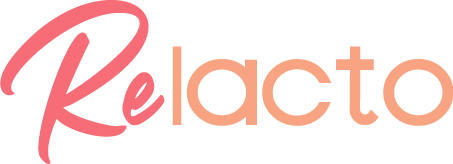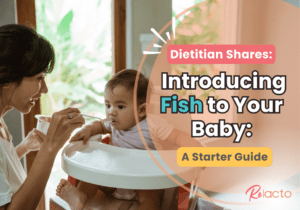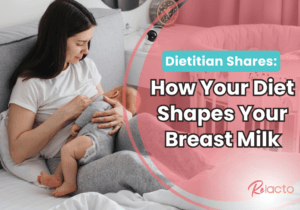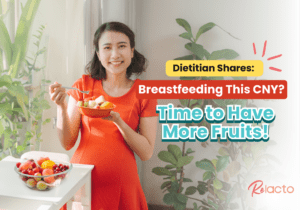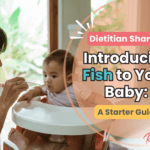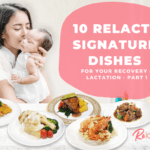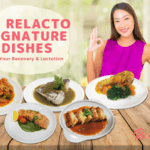Dietitian Shares: What Does A Healthy Diet Look Like For A Breastfeeding Mother?
Breastfeeding mothers are often encouraged to take a lactogenic diet or breastfeeding-friendly meals after the confinement period. Ever wondered what these diets are actually about?
Many of the lactogenic diet and breastfeeding-friendly meals available in the market focus on incorporating “traditionally known lactogenic ingredients” regularly into the meals such as fennel, fenugreek, ginger, garlic, oats, and so much more. The truth is, that research on these ingredients suggests that more evidence is still needed to understand its potential benefits and effectiveness in such practices.
When you ask a doctor about it, they typically do not have any specific dietary recommendations for breastfeeding mothers. So are we missing something here? What kind of nutritional support do mothers need as they breastfeed their babies during this time?
As we dive into this together, let’s take a look at how many breastfeeding mothers are eating according to recommendations/healthily.
Singapore Health Promotion Board’s Guidelines for mothers who are breastfeeding state that
“The nutrient needs of a woman reach the all-time high during breastfeeding. Eating the right diet ensures that a woman can breastfeed her baby successfully. Optimal nourishment helps to support milk production and maintains the ideal nutrient quality of breastmilk.”
So, how are the diets of breastfeeding mothers potentially affecting their babies?
- It can influence their taste preferences
- It can influence their body composition
- It can influence their risk of developing food allergies
- It can influence their risk of metabolic diseases
Therefore, mothers are encouraged to continue a healthy diet even after pregnancy. Maintaining a healthy diet and lifestyle as a family helps you give your little one the best start in life possible.

So What Does A Healthy Diet Look Like For A Breastfeeding Mother?
The Singapore Health Promotion Board recommends breastfeeding mothers to have a nutritious diet that provides high protein and iron-rich foods, oily fish, dairy foods and whole grains. It is also important to remember that fruits and vegetables should be a key part of the diet.
My Healthy Plate
One of the easiest way to achieve that is by following the healthy plate in which half the plate is filled with vegetables, quarter of the plate is filled with chicken/fish/meat and the remaining quarter of the plate is filled with grains, preferably wholegrains as per below
Adequate Water Intake
As breast milk is mainly made up of water, it is critical for mothers to keep up with their fluid intake throughout the day as mothers will be at higher risk of dehydration and constipation. Lack of adequate water intake can also lead to tiredness and headaches. In severe cases, it can affect breast milk production too.
It is recommended for mothers to aim for at least 1.5 to 2 litres of water daily. Apart from plain water, soups and milk are great choices of fluids to support you with adequate hydration.
Pro tip: Sometimes, we get too busy with the baby, work and house chores. Thus, it is important to make sure that your bottle of water or jug of water is in plain sight. The more visible it is in the spaces you spend most of your time in at home and at work, the easier it will be to remember to drink water.
Fish Intake
Fish are the main sources of Omega 3-DHA in our foods. Omega 3-DHA is essential for both mothers and babies. Studies have shown that adequate maternal intake of Omega 3-DHA during postpartum is linked with a lower risk of postpartum depression. Adequate intake of DHA in babies is also linked with a potentially lower risk of developing food allergies.
It is highly recommended for both pregnant and lactating women to consume two to three servings of oily fish that are low in mercury per week.
Some of the common fish that are rich in Omega 3-DHA but low in mercury are skipjack tuna, salmon, Spanish mackerel, Atlantic mackerel and sardine. Fish that should be avoided are shark, swordfish, king mackerel and herring just to name a few.
Calcium-rich foods
Besides that, it is important for mummies to obtain adequate calcium intake. Although the calcium content of breast milk is not influenced by maternal dietary intake, adequate intake is still essential for a mother’s bone health. Calcium also plays a role in healthy functioning muscles.
It is recommended for mummies to obtain 1000mg of calcium per day which is equivalent to 3 servings of calcium-rich sources such as low-fat milk, cheese, yogurt and tofu.
Summary
In summary, a healthy diet is vital for a breastfeeding mother to ensure the well-being of both herself and her baby. It supports optimal nutrition, energy levels and the overall quality of breast milk. These are the main parts of nutrition that mummies should be aware of, especially after the confinement period. A weekly menu plan may be useful in order for you to track your intake easily so that you can be more aware of how your diet is and tweak accordingly. Alternatively, these days, lactation food delivery services are available for you to consider if you have too much on your hands or especially if you have started going back to work.
